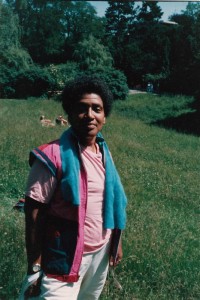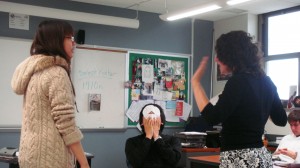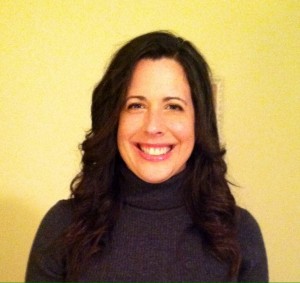Personal is Political: Reconciling Feeling and Thinking: A Call to Action in the Name of Difference
By Rachel Edwards
As a student in the first graduate class taught by Aishah Shahidah Simmons dedicated to the study of Audre Lorde’s life and work at Temple University in spring 2013, I read Sister Outsider, I Am Your Sister: The Collected and Unpublished Writings of Audre Lorde, and Zami: A New Spelling of My Name for the first time. While reading these texts, I became intrigued by Lorde’s discussions of thinking versus feeling and difference. Initially these thematic threads seemed separate, yet I began to see how they intersected, particularly as Lorde highlighted the social valuation of thinking over feeling which is often seen as male versus female attributes respectively. Lorde says in “Poetry is Not a Luxury” that “The white fathers told us: I think, therefore I am. The Black mother within each of us – the poet – whispers in our dreams: I feel, therefore I can be free.” [i] These few sentences particularly connected with my experiences in academia as a graduate student where reason is promoted over feeling, the male over the female. For as Susan Jarratt notes in “Feminism and Composition: The Case for Conflict” when commenting on Sally Miller Gearhart’s “The Womanization of Rhetoric,” “Those who have enjoyed position of power in the field of discourse within which Gearhart dwells – namely white men – have for centuries been responsible for normalizing ‘reason’.” [ii] This promotion of reason over feeling within academia or the rational argument over the dialogue involved in sharing ideas, has often led women to conceal this difference within the classroom, departmental meeting or collegial exchange. At its most insidious, this emphasis of rationality over feeling can make women in academia feel inadequate or less intelligent. I like, therefore, when Nancy K. Bereano in the “Introduction” to Sister Outsider renders this conflict between thinking and feeling as “The white patriarchal ordering of things” that “requires that we believe there is an inherent conflict between what we feel and what we think – between poetry and theory.” [iii] I began to question, therefore, why can’t there be a “reordering of things” where, as Lorde suggests, difference is “a dialect and a resource” so that the use of rationality as well as feeling, the analysis and gut reaction to poetry and theory, becomes acceptable both in the classroom as well as in the publication. [iv]
For in my experience as a teacher pedagogically, when I use my feelings, particularly my empathy to intuit what others are feeling, feelings most likely different from mine, it is then that I make the most powerful connections with my students. These emotional connections lead to powerful personal insight and, in turn, intellectual and pedagogical growth. I remember an exchange I had with a student from a first-year writing class where I asked to meet with him because in a reflection paper he had written that he was finding group work within the class not as productive or conducive to applying the skills and ideas presented in class as he would have liked. I made it clear that I was not upset by his feedback and really wanted to know more about what exactly he saw as barriers to his group’s productivity. This student was a bit taken aback at first, but after his suggestions and insights were well received. He went on to share with me that he really felt I was different from his other instructors because I cared about helping my students learn to write well and this is what led him to feel invested in what we were learning and more apt to take risks and put effort into the tasks he was asked to complete for the class. I share this incident to highlight how my investment in unearthing the feelings or reactions of my students and uncovering their cause is essential to the shaping of my pedagogical approach. An approach that is responsive to these feelings, but often different from other instructors who tend to brush off feelings and opinions, or even personal experiences as they connect to content as superfluous. Thus, in taking into consideration feelings in addition to logical ordering and connection in both planning and executing my own curriculum I am different.
Yet, this difference has often led me to feel, as Lorde has, as a “sister outsider”, where “the sadness and the deprivation and the loneliness of that discarded, torn, and brick-caught silk stocking, broken and hanging against the wall in the tenement rain” is emblematic of her relation to her own family, particularly her sisters Phyllis and Helen. [v] I, too, feel connected to other teachers in name, but also like an outsider because my approach and way of thinking about teaching is different. This has been especially true in the high school arena when I taught for 11 years and after much struggle, became well-respected as a teacher because of my student’s high test scores and rapid improvement, but had no peers who shared my perceptions or understood my approaches. While my difference as a teacher has led to what Lorde calls in “The Master’s Tools Will Never Dismantle the Master’s House”, “that raw and powerful connection from which our personal power is forged,” it has often left me lonely and isolated.[vi]
Now, as a graduate student in English, for the first time, my different way of thinking about what I read has been met with social approbation because originality leads to publication and acclaim. I sometimes feel that in redefining myself as a theorist and teacher that I, as Lorde so sagely observed in “The Transformation of Silence into Language and Action,” “respect [my] fear” of rejection or belittlement “more than [my] own needs for language and definition.”[vii] Reading and reflecting on Sister Outsider, I Am Your Sister and Zami: A New Spelling of My Name Lorde has inspired me to look for ways to transform my “silence” into “language and action” within the ultra-conservative, white male dominated academic world. I think I can do it best, as Lorde did, through openly discussing and sharing my different approach to teaching and writing. In “My Words Will Be There” Lorde asserts, “teaching and writing were inextricably combined” [viii]and adds in “Poet as Teacher-Human as Poet-Teacher as Human” that “a writer by definition is a teacher” [ix]and goes on to say in “Poetry Makes Something Happen” that “If I never teach another class, every poem I create is an attempt at a piece of truth formed from the images of my experience, and share[d] with as many others as can or will hear me.”[x] Thus, when reading these essays I came to understand how teaching and writing are inextricably linked to the wide dissemination of provocative alternative truths. Yet, Lorde not only saw teaching through her writing as just able to move the individual, but also stimulate group action against social, cultural and political injustices. I would charge, therefore, that she would answer the question she posed in her interview with Adrienne Rich, “How do you deal with things you believe, live them not as theory, not even as emotion, but right on the line of action and effect and change?”[xi] by replying, “Through what I teach my readers through my poems.” In fact, Lorde described teaching as “the front line for me” because “the learning process is something you can incite, literally incite like a riot.”[xii] This is what I too aspire to do through essays like these that look to boldly and openly examine both my thoughts and feelings involving academic expectations and roles that are tacitly understood and accepted but often not directly discussed. Moreover, I want to show others that different approaches to teaching involving thinking and feeling most often will incite students to action within the classroom and curb the devolution into apathy that is so often complained about. I hope that this will promote academic elevation of the dialogic and interpersonal, the feelings behind the thoughts, as well as the difference that inspires it.
Bibliography
Bereano, Nancy K. Introduction to Sister Outsider: Essays and Speeches by Audre Lorde, edited by Nancy K. Bereano, 8-12. Berkeley, CA: Crossing Press, 2007.
Jarratt, Susan C. “Feminism and Composition: The Case for Conflict.” In Feminism and Composition: A Critical Sourcebook, edited by Gesa E. Kirsch, Faye Spencer Maor, Lance Massey, Lee Nickoson-Massey, and Mary P. Sheridan-Rabideau, 263-80. Boston: Bedford/St. Martin’s, 2003.
Lorde, Audre, and Adrienne Rich. “An Interview: Audre Lorde and Adrienne Rich.” In Sister Outsider: Essays and Speeches by Audre Lorde, edited by Nancy K. Bereano, 81-109. Berkeley, CA: Crossing Press, 2007.
—. “My Words Will Be There.” In I Am Your Sister: Collected and Unpublished Writings of Audre Lorde, edited by Rudolph P. Byrd, Johnnetta Betsch Cole, and Beverly Guy-Sheftall, 160-168. Oxford: Oxford UP, 2009.
—. “Poet as Teacher-Human as Poet-Teacher as Human.” In I Am Your Sister: Collected and Unpublished Writings of Audre Lorde, edited by Rudolph P. Byrd, Johnnetta Betsch Cole, and Beverly Guy-Sheftall, 182-183. Oxford: Oxford UP, 2009.
—. “Poetry Is Not a Luxury.” In Sister Outsider: Essays and Speeches by Audre Lorde, edited by Nancy K. Bereano, 36-39. Berkeley, CA: Crossing Press, 2007.
—. “Poetry Makes Something Happen.” In I Am Your Sister: Collected and Unpublished Writings of Audre Lorde, edited by Rudolph P. Byrd, Johnnetta Betsch Cole, and Beverly Guy-Sheftall, 184-187. Oxford: Oxford UP, 2009.
—. “The Master’s Tools Will Never Dismantle the Master’s House.” In Sister Outsider: Essays and Speeches by Audre Lorde, edited by Nancy K. Bereano, 110-113. Berkeley, CA: Crossing Press, 2007. Quoted in Rudolph P. Byrd, “Introduction: Create Your Own Fire: Audre Lorde and the Tradition of Black Radical Thought” to I Am Your Sister: Collected and Unpublished Writings of Audre Lorde, edited by Rudolph P. Byrd, Johnnetta Betsch Cole, and Beverly Guy-Sheftall (Oxford: Oxford UP, 200), 24.
—. “The Transformation of Silence into Language and Action.” In Sister Outsider: Essays and Speeches by Audre Lorde, edited by Nancy K. Bereano, 40-44. Berkeley, CA: Crossing Press, 2007.
—. Zami: A New Spelling of My Name. Berkeley, CA: Crossing Press, 1982.
_________________________________
Rachel E.H. Edwards is currently a Ph.D. student in English specializing in composition and rhetoric and African-American literature at Temple University. After teaching high school English for 11 years, she now works at the Temple University Writing Center and has taught first-year writing as well as courses on literacy and society at Temple. She has also published an annotated bibliography for the Council of Writing Program Administrators CompPile entitled, “Alignments and Alliances: Smoothing Students’ Transitions from High School English to First-Year College Writing” that focuses on what divides high school and college writing curriculum and instruction and ways writing professionals can work together to mend these divisions.
[i] Audre Lorde, “Poetry is Not a Luxury,” in Sister Outsider: Essays and Speeches by Audre Lorde, ed. Nancy K. Bereano (Berkeley, CA: Crossing Press, 2007), 38.
[ii] Susan C. Jarratt, “Feminism and Composition: The Case for Conflict” in Feminism and Composition: A Critical Sourcebook. , ed. Gesa E. Kirsch, Faye Spencer Maor, Lance Massey, Lee Nickoson-Massey, and Mary P. Sheridan-Rabideau (Boston: Bedford/St. Martin’s, 2003), 265.
[iii] Nancy K. Bereano, introduction to Sister Outsider: Essays and Speeches by Audre Lorde, ed. Nancy K. Bereano (Berkeley, CA: Crossing Press, 2007), 9.
[iv] Audre Lorde, “The Master’s Tools Will Never Dismantle the Master’s House ” in Sister Outsider: Essays and Speeches by Audre Lorde, ed. Nancy K. Bereano (Berkeley, CA: Crossing Press, 2007),quoted in Rudolph P. Byrd, “Introduction: Create Your Own Fire: Audre Lorde and the Tradition of Black Radical Thought” to I Am Your Sister: Collected and Unpublished Writings of Audre Lorde, eds. Rudolph P. Byrd, Johnnetta Betsch Cole, and Beverly Guy-Sheftall (Oxford: Oxford UP, 200), 24.
[v] Audre Lorde, Zami: A New Spelling of My Name (Berkeley, CA: Crossing Press: Crossing, 1982), 43.
[vi] Audre Lorde, “The Master’s Tools Will Never Dismantle the Master’s House” in Sister Outsider: Essays and Speeches by Audre Lorde, ed. Nancy K. Bereano (Berkeley, CA: Crossing Press, 2007), 112.
[vii] Audre Lorde, “The Transformation of Silence into Language and Action” in Sister Outsider: Essays and Speeches by Audre Lorde, ed. Nancy K. Bereano (Berkeley, CA: Crossing Press, 2007), 44.
[viii] Audre Lorde, “My Words Will Be There, ” in I Am Your Sister: Collected and Unpublished Writings of Audre Lorde, eds. Rudolph P. Byrd, Johnnetta Betsch Cole, and Beverly Guy-Sheftall (Oxford: Oxford UP, 2009), 161.
[ix] Audre Lorde, “Poet as Teacher-Human as Poet-Teacher as Human ” in I Am Your Sister: Collected and Unpublished Writings of Audre Lorde, eds. Rudolph P. Byrd, Johnnetta Betsch Cole, and Beverly Guy-Sheftall (Oxford: Oxford UP, 2009), 182.
[x] Audre Lorde, “Poetry Makes Something Happen” in I Am Your Sister: Collected and Unpublished Writings of Audre Lorde, eds. Rudolph P. Byrd, Johnnetta Betsch Cole, and Beverly Guy-Sheftall (Oxford: Oxford UP, 2009), 184.
[xi] Audre Lorde and Adrienne Rich, “An Interview: Audre Lorde and Adrienne Rich” in Sister Outsider: Essays and Speeches by Audre Lorde, ed. Nancy K. Bereano (Berkeley, CA: Crossing Press, 2007), 107.
[xii] Ibid., 96, 98.







0 comments